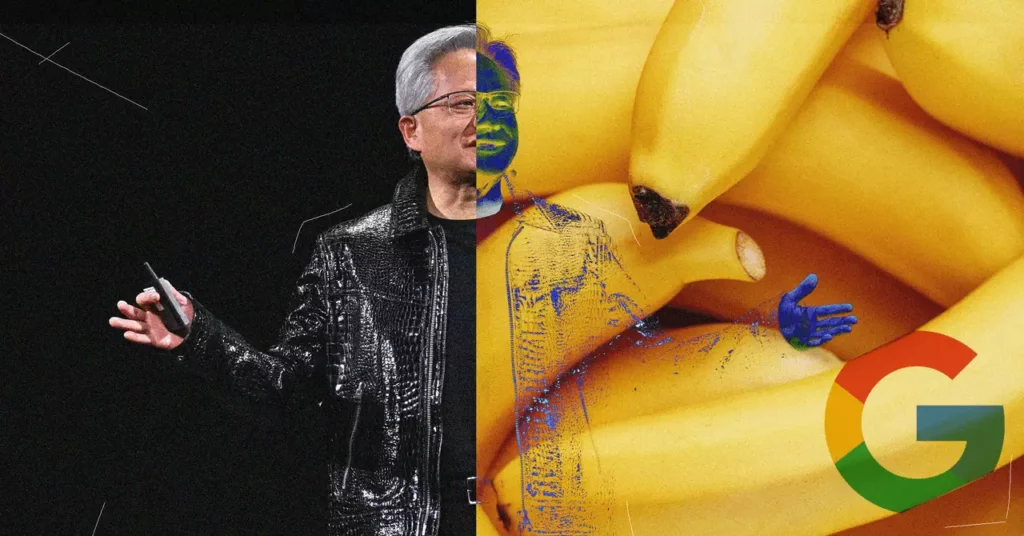In recent times, industry giants like Nvidia and Google project an image of unstoppable progress and limitless potential in artificial intelligence. Their executives, often cloaked in visionary rhetoric, paint a picture of technological utopia—where AI is the ultimate tool for democratization, innovation, and economic growth. Yet, beneath this glossy veneer lies a stark contrast to the reality that naive optimism can dangerously obscure: the tremendous risks of unchecked AI development, socioeconomic upheaval, and strategic vulnerabilities that can threaten national interests.
When Jensen Huang, the charismatic Nvidia CEO, extols the virtues of obscure AI tools like Nano Banana, it’s not merely a casual gimmick but a calculated branding effort. While he waxes lyrical about AI’s ability to enhance learning, streamline work, and serve as a “thinking partner,” this glorification often disguises the deeper, more troubling implications of rapidly advancing AI. The hype helps consolidate corporate dominance while creating an illusion of inclusiveness—an optimistic narrative that everyone will benefit, when in fact, systemic inequalities are likely to deepen.
The critical point is that technological hype tends to be a double-edged sword. It storms ahead, promising prosperity, yet risks sidelining the complex social and geopolitical consequences. Major investments pouring into the UK’s AI infrastructure and data centers are framed as national progress, but these initiatives often overlook the strategic vulnerabilities—such as over-reliance on foreign technology, the potential for misuse, or the centralization of control among a handful of global corporations. With each announcement of hundreds of millions invested, one must ask: what are the true costs, and who bears them?
The Mirage of Democratization: Who Really Benefits?
Huang’s rhetoric about democratizing AI—implying that no one should be left behind—sounds appealing but is fundamentally naive. True democratization of such a powerful technology is far more complex. Power consolidates, not disperses, especially when a small cadre of companies and governments control the most advanced systems and data. The claim that AI will close the technological divide presumes a level playing field that does not exist in practice.
This narrative conveniently ignores the deep socioeconomic rifts that lie ahead. Who will own, control, and profit from the AI revolution? Will the benefit accrue to ordinary workers or to billion-dollar corporations? In centers like London, which are positioning themselves as AI hubs, the promise of technological uplift often masks the reality of increased economic bifurcation. When automation displaces jobs or when AI-driven monopolies dominate markets, the actual beneficiaries will be the few with privileged access—those who can adapt and leverage the new tools.
Furthermore, the use of AI to augment daily work, as Huang enthusiastically describes, is not universally accessible or beneficial. For many, AI remains out of reach—both in terms of digital literacy and tangible opportunity. Rhetoric about AI-assisted productivity and innovation must be tempered with an understanding of widening inequalities. To proclaim AI as a tool for democratization while neglecting the disparities it may exacerbate is highly irresponsible.
The Political and Strategic Blind Spot: Overconfidence Amid Global Tensions
The geopolitical weight of AI is often sidestepped in corporate press releases and industry conferences. Yet, as nations race for supremacy in AI technology, the risks of strategic missteps grow exponentially. The global competition for AI dominance is becoming a new arena of Cold War-like tensions, with nations fiercely guarding their advancements and technologies.
Huang’s glowing remarks on the UK’s AI scene belie a deeper reality: technological dependence on foreign actors, fragmented innovation policies, and security vulnerabilities. Relying heavily on American-style AI infrastructure and investment could render countries like the UK vulnerable to cyber threats, economic coercion, or strategic sabotage. The false sense of security that comes from believing AI is solely a benign force of progress neglects its weaponized potential in cyber warfare, espionage, and information manipulation.
Additionally, the premise that AI will be a force for good ignores the darker side of autonomous systems and deep fakes, which can destabilize societies and undermine democracies. Such risks, brushed aside in celebratory speeches, are very real and must be addressed with sober, strategic foresight—something the industry tends to sideline in favor of hype and short-term gains.
Ultimately, the narrative driven by industry titans like Nvidia adopts an optimistic veneer that conceals the complex, often hazardous realities beneath. While innovation should be encouraged, it must be tethered by a careful, center-right perspective that recognizes the importance of prudence and balanced regulation. We should celebrate progress but not at the expense of security, societal stability, or economic fairness.
The story of AI should not be one of uncritical cheerleading but a sober acknowledgment of its potential pitfalls. As the industry races forward with investments and promises, policymakers, citizens, and thinkers must scrutinize the true implications of this technological leap—beyond Nano Banana branding and corporate hand-waving. Only through a critical lens can society navigate the AI revolution responsibly, ensuring it serves common interests rather than becoming a tool for unchecked corporate or geopolitical dominance.









Leave a Reply